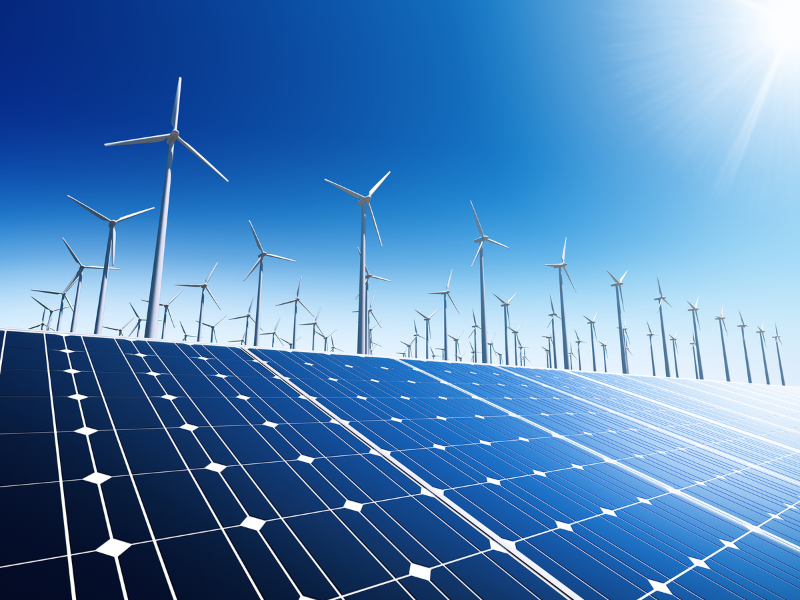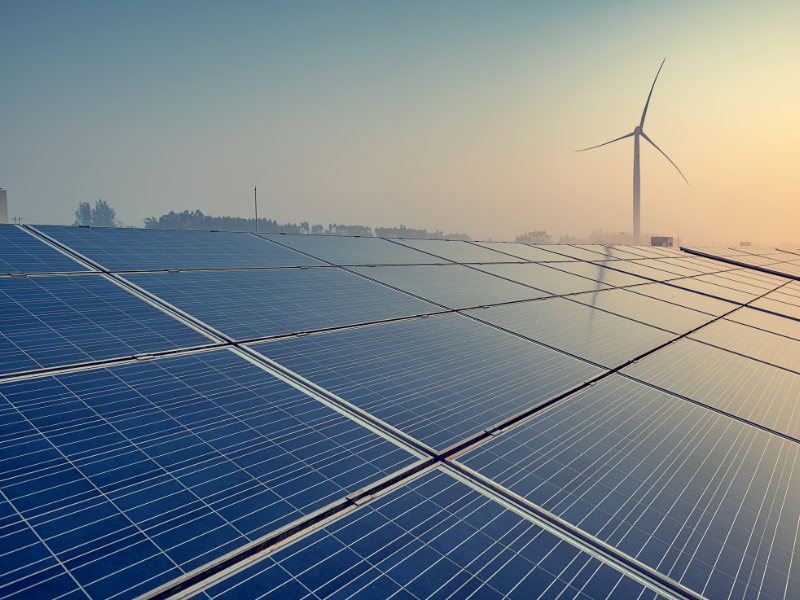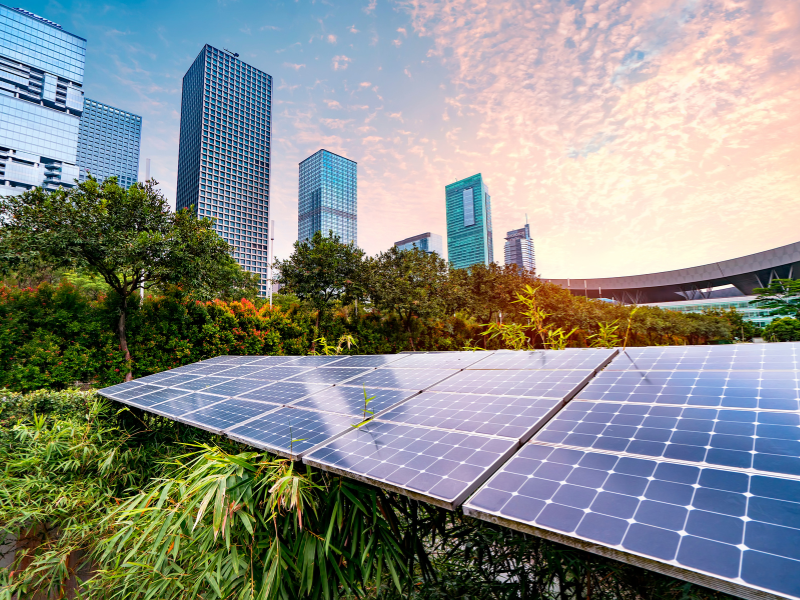Introduction
Renewable energy is rapidly becoming the go-to solution for the world’s growing energy needs. As we grapple with the detrimental effects of climate change and the finite nature of fossil fuels, the best advantages of using renewable energy are becoming increasingly apparent. In this article, we will delve into the numerous benefits of renewable energy, exploring how it not only mitigates environmental harm but also offers economic and social advantages.

From reducing greenhouse gas emissions to creating jobs, renewable energy has the potential to revolutionize our energy landscape. Let’s explore the best advantages of using renewable energy and understand why it holds the key to a sustainable future.
The Best Advantages of Using Renewable Energy

Environmental Friendliness: Mitigating Climate Change
Renewable energy sources, such as solar, wind, hydro, and geothermal power, emit little to no greenhouse gases during their operation. Unlike fossil fuels, they do not contribute to the alarming rise in global temperatures, which leads to climate change and its associated far-reaching impacts. By transitioning to renewable energy, we can significantly reduce our carbon footprint and work towards a greener, more sustainable planet.
Energy Security: Independence from Fossil Fuels
One of the greatest advantages of using renewable energy is the diversification of our energy sources. Overreliance on fossil fuels, which are concentrated in a few regions of the world, poses significant geopolitical risks. By embracing renewable energy, countries can reduce their dependence on foreign oil and gas, enhancing energy security and reducing vulnerability to price fluctuations and supply disruptions.
Cost Savings: Affordable and Sustainable Energy
Contrary to popular belief, renewable energy has become increasingly cost-competitive with traditional fossil fuel-based sources. Technological advancements, economies of scale, and supportive government policies have significantly reduced the cost of solar panels, wind turbines, and other renewable energy infrastructure. As a result, renewable energy offers long-term cost savings, with lower operating and maintenance expenses compared to conventional power plants.
Job Creation: Powering Economic Growth
The transition to renewable energy is not only environmentally beneficial but also economically advantageous. The renewable energy sector has emerged as a major source of job creation, presenting opportunities for employment across various skill sets and educational backgrounds. With the growth of solar and wind installations, the demand for engineers, technicians, project managers, and researchers in the renewable energy field has skyrocketed, driving economic growth and prosperity.
Health Benefits: Cleaner Air and Improved Quality of Life
Burning fossil fuels for energy production releases harmful pollutants into the air, leading to respiratory problems, cardiovascular diseases, and premature deaths. In contrast, renewable energy sources produce clean power without the emission of pollutants such as sulfur dioxide, nitrogen oxides, and particulate matter. By transitioning to renewable energy, we can minimize air pollution, safeguard public health, and improve the overall quality of life for communities around the world.
Resource Efficiency: Sustainable Resource Management
Renewable energy sources, by their very nature, are sustainable and do not deplete finite resources. Unlike fossil fuels, which require extraction and refining, renewable energy harnesses power from naturally occurring sources, such as sunlight, wind, and water. This resource efficiency minimizes the strain on natural resources, ensuring their availability for future generations and promoting sustainable resource management.
Technological Innovation: Driving Global Competitiveness
Investments in renewable energy have spurred technological innovation and research and development (R&D) activities. As governments and businesses strive to harness the vast potential of renewable energy, new technologies, materials, and systems are being developed. This not only improves the efficiency and reliability of renewable energy systems but also positions countries or companies at the forefront of global competitiveness. Technological advancements driven by renewable energy research have wide-ranging implications beyond the energy sector, driving innovation across industries.
Energy Access: Powering Underserved Communities
Renewable energy has the power to bring electricity to remote, underserved communities that are not connected to the conventional power grid. Solar panels, microgrids, and small-scale wind turbines can provide reliable and affordable electricity to homes, schools, and healthcare facilities in off-grid regions. By expanding access to clean energy, renewable sources bridge the energy gap, thereby improving education, healthcare, and overall socio-economic development.
Resilience: Climate Adaptation and Disaster Preparedness
As the frequency and intensity of extreme weather events continue to rise, building resilient energy infrastructure becomes crucial. Renewable energy systems, such as solar panels and wind turbines, are decentralized and can be easily distributed across regions, reducing vulnerability to infrastructure damage during natural disasters. This decentralized nature of renewable energy enhances community resilience and facilitates faster recovery from climate-related disruptions.
Reduced Water Consumption: Conservation of a Precious Resource
Traditional power plants, especially those fueled by coal or natural gas, require copious amounts of water for cooling purposes. This high water consumption contributes to water scarcity, especially in arid regions. In contrast, most renewable energy technologies have minimal or zero water requirements during operation, conserving this precious resource and reducing the strain on water supplies.
Energy Independence: Empowering Communities and Individuals
Renewable energy empowers communities and individuals to generate their own electricity, increasing energy independence and self-sufficiency. With the installation of rooftop solar panels or small wind turbines, homeowners and businesses can produce their own clean energy, reducing reliance on the centralized power grid. This decentralized energy production scheme not only lowers electricity bills but also enables individuals to take an active role in combating climate change, fostering a sense of environmental stewardship.
Sustainable and Resilient Infrastructure: Building for the Future
As governments and businesses invest in renewable energy infrastructure, they contribute to the development of sustainable and resilient cities. Renewable energy projects can be integrated into new buildings, urban planning, and transportation systems, promoting sustainable development practices. By incorporating clean energy into the fabric of communities, cities become more resilient, adaptable, and environmentally conscious, resulting in enhanced livability and a better quality of life for residents.
FAQs

Q: What are the key advantages of using renewable energy?
Renewable energy offers numerous advantages, including environmental friendliness, energy security, cost savings, job creation, improved public health, sustainable resource management, technological innovation, and so much more. It presents a holistic solution to mitigate climate change and promote long-term sustainable development.
Q: How does renewable energy contribute to economic growth?
Investments in renewable energy have the potential to drive economic growth by creating jobs, attracting investments, fostering technological innovation, and reducing energy costs. The renewable energy sector is a major driver of employment, generating opportunities across various skill levels and industries.
Q: Can renewable energy improve energy access for underserved communities?
Absolutely! Renewable energy has the potential to power remote, off-grid communities, providing them with reliable and affordable electricity. Solar panels, wind turbines, and microgrids can be deployed to facilitate energy access, thereby improving education, healthcare, and overall socio-economic development.
Q: What role does renewable energy play in mitigating climate change?
Renewable energy plays a crucial role in mitigating climate change by reducing greenhouse gas emissions. Unlike fossil fuels, which release carbon dioxide and other pollutants, renewable energy sources produce clean power without contributing to the warming of the planet. By transitioning to renewable energy, we can significantly reduce our carbon footprint and work towards a greener, more sustainable future.
Conclusion

Renewable energy offers a multitude of advantages, ranging from mitigating climate change to driving economic growth and improving public health. The transition to renewable energy presents an unprecedented opportunity to reshape our energy landscape, fostering a sustainable and resilient future.
By embracing renewable energy technologies and policies, we can build a world where clean power is the norm, fostering environmental stewardship, and safeguarding the well-being of future generations. Let us harness the best advantages of using renewable energy and embark on a journey towards a brighter and more sustainable future.

